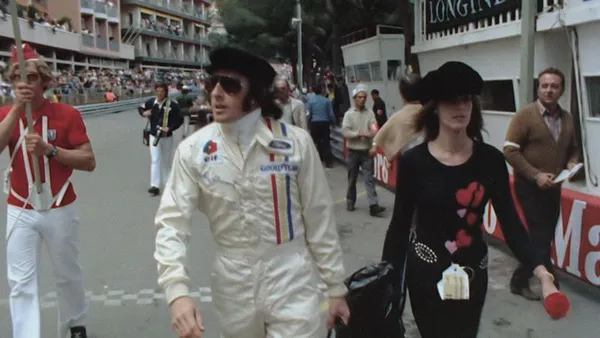 |
| Jackie and Helen Stewart in Weekend Of A Champion |
During a press conference at the Crosby Street Hotel in downtown Manhattan for Weekend Of A Champion, Jackie Stewart, co-producer Brett Ratner, and Roman Polanski via Skype discussed how little and how much has changed in Formula One racing, the sport's safety, style, and their friendship. The dyslexia Stewart has in common with George Lukas and Steven Spielberg, how Polanski analyses joyfulness then and now, and why Ron Howard's Rush should not be overlooked were among the topics conferred. For all the crucial information about racing, it is the genuine friendship between Polanski and Stewart that is most poignant for over 40 years since they met at the time of Rosemary's Baby.
Roman Polanski's long weekend with Jackie Stewart shows both men with substantial sideburns and the feathery disheveled cool early Seventies hair. When Stewart cuts himself while shaving, he shouts for Polanski to come to the bathroom and film it, because Roman 'likes blood in his movies'.
In Weekend Of A Champion, Polanski mocks Stewart's driving, gesticulating wildly with jittery arms. "Where is that smoothness you were talking about?" And Stewart explains again, calmly, sincerely, how not to upset the car while they go for another drive on the streets of Monte Carlo, past the yachts and into the tunnel.
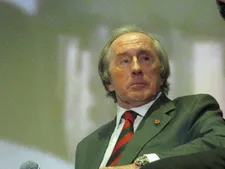 |
| Jackie Stewart listening to Roman Polanski on the recent filming: "I managed to get the same suite in Hôtel de Paris in Monaco." Photo: Anne-Katrin Titze |
The same tenderness and fun they shared in the past, shines through in the present.
Jackie Stewart: What age are you? You're about 19 now, Roman? And he skis like an idiot, he drives like a fool, and he's got more energy than I don't know who. Roman hasn't changed very much since we started the movie way back in 1971. Are you alright, Roman?
Roman Polanski: I'm fine, thank you.
At the press conference via Skype, Polanski told how the film was saved from oblivion.
RP: It was an accident, pure accident that the lab in London, the technical lab, was getting rid of their old stuff and they contacted me asking what I want them to do with the negatives of the film, whether they can destroy it or if I wanted them to send it to me or whatever instructions from me they had they would follow. And my instruction was, 'hold on, wait a second.' So I looked at the film and I liked it after 40 years almost. I decided I will give it a new life and that's what we saw today.
On giving the film a new life.
RP: I saw it a couple of times with my editor. The pace was not satisfying so I thought, it will need some editing, little editing and I would like to add to it a contemporary part so I called Jackie and his son Mark who subsequently became the co-producer of this enterprise. And I showed them the picture. They were all very happy with the idea of giving it this new life.
The footage of the two men talking in the same Monte Carlo hotel suite is revealing and displays the same tenderness and fun they shared in the past.
RP: When I started editing I realised that there is much more to be done than I was expecting. It took me a long time with an enormous amount of work to have it in a presentable shape, to have it in a pace which today is acceptable. And then when I had it all put together - I would not say entirely, but in a good shape to revisit it again with Jackie, that is what we did, literally. I managed to get the same suite in Hôtel de Paris in Monaco. We put the television in the position that you see it in the picture and then we did the conversation that was filmed.
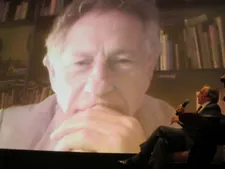 |
| Roman Polanski Skyped in for Weekend Of A Champion Photo: Anne-Katrin Titze |
JS: It was a fantastic cadeau for the Cannes Film Festival to select Roman's film of 40 years ago. To rerun it in front of everyone in Cannes was a big deal. When I saw the film again it was like stepping back in history and I think this is one of the attractive things. I've just done an interview with Sports Illustrated and Road and Track Magazine and I think the appeal that's causing people to like it, certainly in Europe, is the fact that, you know, safety was totally different in those days. Roman did a lot of this filming himself. He was working the cameras in a great many parts of the movie but when you see the cars passing the pits as they are, there was no barrier in front of the pits, for example. There's hundreds of gallons of high octane fuel and hundreds of people standing there without any protection, whereas today, because of what we've done in safety that could never have been allowed to happen. We step back in time and many of the people you will see in the film are no longer with us either because they were killed. Because at that time, if I was driving a racing car as I was for a five year period, there was a two out of three chance you were going to die because of the lack of safety which you see all the way through Roman's film. The curbs are like normal sidewalk curbs, the break, tires and wheels and everything in those days. Roman saw the logic of rerunning today's Monaco Grand Prix circuit as it was then, it was a totally different place in many ways but the geography of the track was the same. And I think it took somebody of Roman's skills and imagination, because he's got a great imagination, to see that it would still run and be interesting today.
The producer talked about how his involvement with the project began.
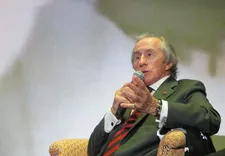 |
| Jackie Stewart: "When I saw the film again it was like stepping back in history." Photo: Anne-Katrin Titze |
Brett Ratner: I don't remember when it was. I was in Paris and [he said]: I just finished a documentary that I did in 1971 would you like to see it? Roman and I sat in a theatre, watched it. It was amazing. I just thought it was brilliant, I'm a big fan of Mr. Stewart and I'm also a big Formula One fan and I had seen a trend of Formula One growing in the United States. It would be great to get distribution for the film and give it an opportunity to see the light of day. It had never been released in the United States. I think it was only in one theatre in Paris and maybe a German film festival [the Berlin Film Festival]. There really wasn't an outlet for documentaries back in 1971, there wasn't HBO and Showtime and all these outlets that are playing documentaries today. This movie was made for the big screen.
Jackie and his wife Helen, who is also seen in the footage, recounted that 53 people they knew, "five of our best friends were killed." It has now been 18 years since a driver lost his life in a Formula One race.
JS: We have been good good friends since the mid-sixties because Roman was a big enthusiast of motor racing. For us to be friends then and have been friends ever since, it's like the talk never stopped… For me at the time and my wife Helen, to put up with Roman Polanski for the entire weekend, ruffling Helen's hair up! 'You got to look as if you just woke up.' These are great memories.
Asked about competition in fame.
RP: There was no competition at the time. When I was making Rosemary's Baby (1968) that was about the time when the two of us met [Jackie and Roman] in Los Angeles. He was in his field, I was in mine. The reason I made the film was first because I wanted to make a film about a friend, about Jackie specifically. And two because I like that sport very much and I thought it was a very cinematic, very visual kind of sport. The real life the film may have right now.
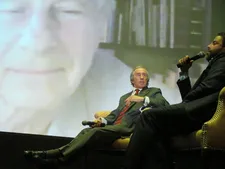 |
| Brett Ratner comments to Polanski and Stewart: "I'm a big fan of Mr. Stewart and I'm also a big Formula One fan." Photo: Anne-Katrin Titze |
JS: Because it was Roman Polanski, we had total access. To the circuit, to the principality. Princess Grace and Prince Rainier, we knew everything that was happening. We had total access with the automobile club. with the camera it was like having the Eiffel Tower on the back of the car.
On the atmosphere in Monaco.
RP: The atmosphere of that place, the glamour, the joy actually. People tend to have difficulties to believe that we were really happy and joyful. That is not the atmosphere of today.
On making a documentary.
RP: I never considered myself talented in this direction. I didn't consider myself a director of documentaries, particularly in that period. Documentaries were not as frequently successful as they are now. There are many more of them now because of television. You see many more documentaries in the theaters. In those times it was very very seldom that you could hope to have any kind of success with a documentary in any general theatrical release. In those times when I decided to make this film I asked my friend Frank Simon to direct it. Frank was a young American director from New York whom I met in Cannes during the film festival. He was showing a documentary called The Queen (1968), it was about the first drag queen contest in New York. It was a very good documentary, funny and unusual and quite daring. Unfortunately it was famous in May 1968 when it was a student revolution in France and the festival was aborted, so Frank never got the prize. But I got a friend in this festival. And I decided to make this film, I said I'll produce it, you direct. And the first Weekend Of A Champion was done by Frank Simon. I worked a lot on it. I filmed, I often had the camera in hand, I helped with the editing etc., but he did the first version of this movie.
Stewart on his dyslexia.
JS: I'm a severe dyslexic. I can't recite the alphabet. I don't know it. I don't know the words of my own national anthem, I don't remember them. I don't know the words of the Lord's Prayer. However, a dyslexic because he or she can't think like the clever folk, we think out of the box. We find new ways of doing things. I would be surprised if there weren't a little bit of dyslexia in Roman Polanski. Steven Spielberg is dyslexic. George Lukas is dyslexic. A lot of entertainers are dyslexic, a lot of sports people like Muhammed Ali are dyslexic. It brings out something that nobody else has.
Reaction to the racing movie Rush directed by Ron Howard.
RP: I've seen Rush (2013) and I can tell you, in the beginning I thought 'Oh my god I think I'm going to walk out on this' but I somehow sat through and it gets better and better and finally, after, I would say, a few minutes of patience, it gets you really involved and is very satisfying. I think it has a great couple of actors looking exactly like the fellows we both knew and it's a very good movie. I think that movie doesn't actually enjoy the success it deserves. It's a really nice motor racing movie.
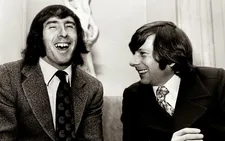 |
| Jackie Stewart on his friendship with Roman Polanski: "We have been good good friends since the mid-Sixties because Roman was a big enthusiast of motor racing." |
JS: I think so too, I have seen the movie and I like it. I think the actor that plays Niki Lauda [Daniel Brühl], I think he's so good I would like to see him nominated because he was better than Lauda at Lauda. I think he studied him so clearly, and his walk, his expressions, the manner in which he lived his life, this guy really caught him and I hope he gets a nomination.
The joy and the worry on Formula One racing driver Jackie Stewart's face never speak of the death drive in the beautifully candid Weekend Of A Champion, possibly the film showing the least self-destructive behavior I have seen all year.
Weekend Of A Champion opens in New York on November 22.





















